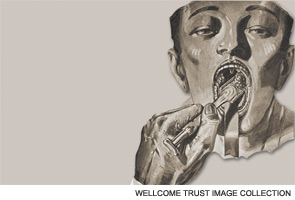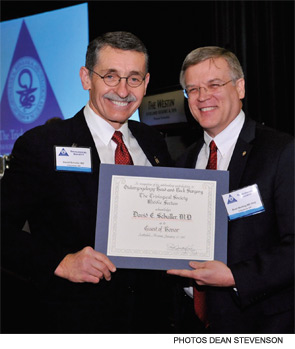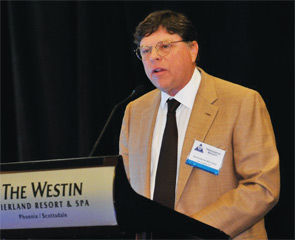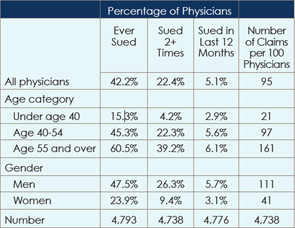In its ongoing commitment to develop and practice evidence-based medicine, the American Academy of Otolaryngology-Head and Neck Surgery (AAO-HNS) recently issued a new clinical practice guideline on tonsillectomy in children.



The system of clinical cancer research, including that of head and neck cancer, is in need of an overhaul, but steps are being taken that might lead to more efficient work and will hopefully mean more medical breakthroughs, said David Schuller, MD, the chair in cancer research at the Ohio State University College of Medicine in Columbus, at the Triological Society’s Combined Sections Meeting, held here on Jan. 27.

The debate over soaring health care costs fails to properly acknowledge the benefits that have stemmed from improved medical technology and expanded medical knowledge, said Triological Society President Gerald Berke, MD, in an address at the society’s Combined Sections Meeting, held here on Jan. 27.
Physician groups representing otolaryngologists have ambitious 2011 policy and legislative agendas that include pushing for replacement of the Medicare physician payment formula and helping to shape health reform’s implementation.

The health care reform law passed in March created a $50 million demonstration program to test alternatives to the current medical liability system. But reaction is mixed as to whether the new project will help fix what the physician and medical liability insurance communities view as a flawed and inefficient system.
The patient-centered medical home’s star appears to be rising. Thirty-eight states are testing this model of care in some way, according to the National Academy for State Health Policy. The federal health system reform law, passed this spring, includes several provisions encouraging the concept.
The new duty hour regulation from the Accreditation Council for Graduate Medical Education (ACGME) that limits first-year residents to 16-hour shifts has drawn a conflicted chorus of reactions from attendings, who have only seven months before the stipulation goes into effect.

With greater scrutiny of doctors and easier access to information about doctors’ education, the American Board of Otolaryngology’s Maintenance of Certification (MOC) program is more important than ever, said Robert Miller, MD, executive director of the American Board of Otolaryngology (ABOto).

Pediatric ambulatory surgery centers are fast-paced, high-volume places with many of the ingredients that can contribute to safety concerns, a patient safety expert from Children’s National Medical Center (CNMC) said at the 2010 Annual Meeting of the American Academy of Otolaryngology-Head and Neck Surgery (AAO-HNS), held here Sept. 26-29.

Need an incentive to implement an electronic health records (EHR) system in your practice? How about $44,000? That’s the amount the federal government is making available to eligible physicians as part of its effort to speed up the adoption of health information technology throughout the U.S. In fact, under the Health Information Technology for Economic and Clinical Health Act (HITECH Act), part of the American Recovery and Reinvestment Act of 2009, billions of federal stimulus dollars are flowing to medical practices throughout the U.S. to help physicians set up EHR systems.